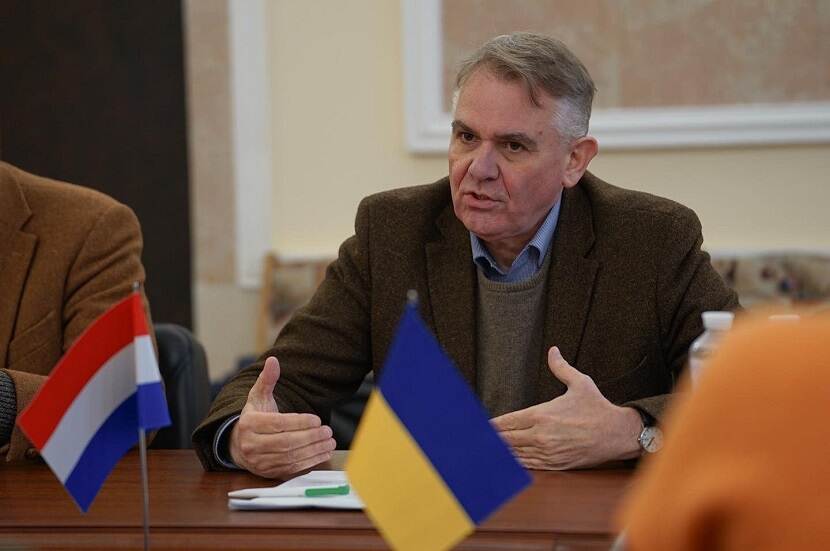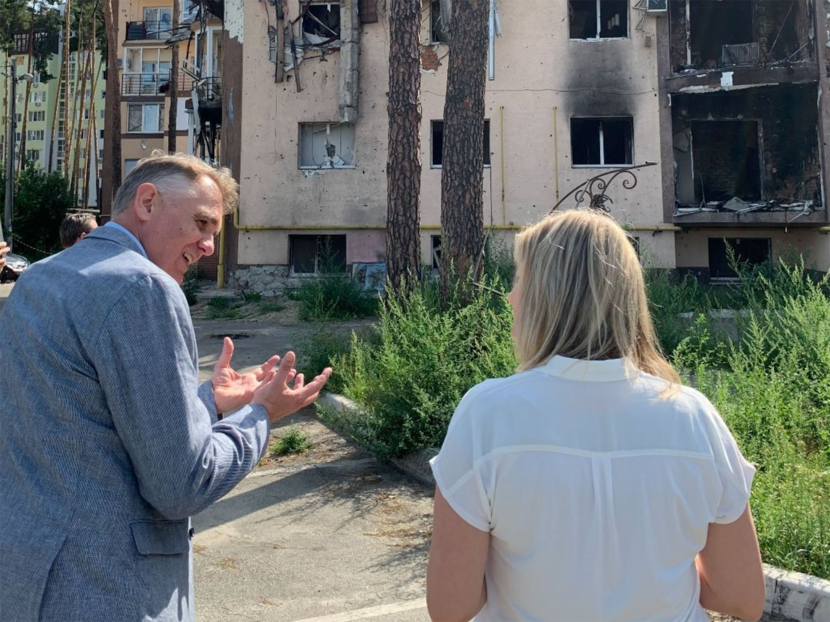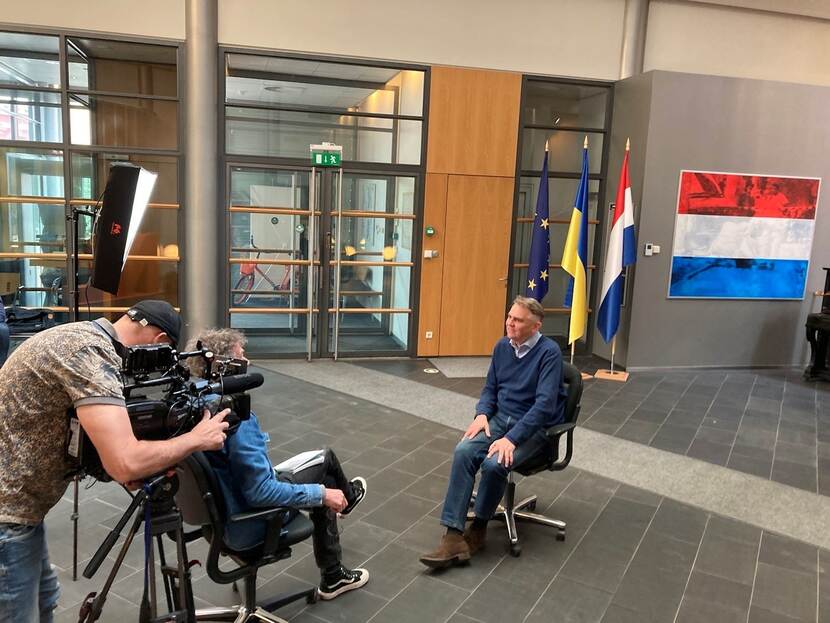Ambassador Jennes de Mol: ‘The scale of human suffering in Ukraine is almost beyond comprehension’
Weblogs
For Jennes de Mol, the Dutch ambassador to Ukraine, the war with Russia actually began back in 2014, with Russia’s illegal annexation of Crimea and the downing of flight MH17. The invasion of Ukraine on 23 February 2022 marked the start of a new phase of extreme violence, and one he fears will not end anytime soon. ‘This is a war about freedom, culture, values and identity. Russia wants to wipe Ukraine off the map.’

You took up your post as Dutch ambassador in Kyiv in 2019. What were your main activities in that initial period? What issues was the Dutch embassy concerned with at that time?
‘I travelled around Ukraine a lot in that initial period. I went from Odesa to Kharkiv, for example, and on to the ‘contact line’ – the border where Ukrainian armed forces in the Donbas were facing off against the separatists. Those separatists were Russian soldiers, though we weren’t 100% sure of that back then.
‘The embassy’s work at that time consisted of diplomatic activities, such as maintaining political contacts, as well as fostering economic and agricultural cooperation, and providing consular services – passports and visas – to Dutch and Ukrainian nationals respectively. The embassy was already feeling the impact of the conflict with Russia: we were dealing with the aftermath of the downing of flight MH17 and supporting demining efforts in areas near the contact line. We were also working to support journalists, foster the rule of law in Ukraine, combat corruption and promote the rights of LGBTIQ+ people.’
Before you became ambassador in Kyiv, you worked in Africa and Afghanistan, but you’d mainly had postings in Central and Eastern Europe and Russia, such as in Moscow, Prague and St Petersburg. Why does this region appeal to you?
‘It was more coincidence than anything. When I performed my military service in the early 1990s, the Berlin Wall had just come down, and I opted to learn Russian at the School of Military Intelligence. I developed a good command of the language, not realising that a chance decision would form the thread running through my entire career. If I look back now, I can see that my knowledge of Russian has brought me into contact with people all over the world. Not only in Russia and Ukraine, but also in Afghanistan, for example. Many educated Afghans speak Russian and are proud of that.
‘After my military service I joined the Ministry of Foreign Affairs. First, I was based in The Hague, where I worked on Tanzania, and then I was posted to the embassy in Moscow. During Yeltsin’s presidency I was Cultural Attaché in Moscow, then Deputy Ambassador in Prague, and later Consul-General in St Petersburg. So when I eventually became ambassador to Ukraine, I was very familiar with the region. In fact, I’d already spent time in Kyiv in connection with the downing of flight MH17.’

When did you start to feel that a Russian invasion was truly imminent?
‘At the embassy we’d actually been preparing for a possible Russian invasion since 29 November 2021, when we received reports of 120,000 battle-ready Russian troops amassing at the border. In addition, towards the end of 2021 Russian war rhetoric became more and more strident. Our embassy had to prepare for every eventuality, such as disruption of water and power supplies, or a communications black-out. We held a meeting for Dutch nationals, to brief them on the situation, and we worked on evacuation scenarios and exit routes. With the invasion looming, the partners of the embassy staff left the country, my wife included. Despite the build-up and all the preparations, the actual invasion on the night of 23 February still came as a major blow. It was surreal. I left Kyiv with literally one bag and a file of key documents.’
'Returning to Kyiv, along the same route we’d taken during the evacuation, was an emotional experience. We saw the destruction everywhere, and all the upheaval the Ukrainian people were facing.'
How do you look back on the past year?
‘When I look back now, I think about that initial period, when our embassy was working from Lviv, in the west of the country. And then, after that, the move to Poland, when Lviv also became too dangerous. In Poland, all the hotels were full, and we ended up knocking on the door of a monastery, where we were welcomed with open arms. It was quite an overwhelming experience, having to suddenly flee like that.
‘In late April, after the Russian assault on Kyiv failed, a small group of us returned to the embassy. The rest of our team is still spread across Europe, working in Germany, Belgium and the Netherlands. Returning to Kyiv, along the same route we’d taken during the evacuation, was an emotional experience. We saw the destruction everywhere, and all the upheaval the Ukrainian people were facing. We passed through towns like Irpin and Bucha, where the Russians had murdered hundreds of civilians.
‘It was moving to see my colleagues at the embassy again, and to hear their stories. There was an ominous atmosphere in the city: it was a ghost town. But now that’s changing. It’s estimated that 3.5 million of the city’s 4.5 million inhabitants are now back living in Kyiv. So clearly, many have returned. Everyone’s trying as much as possible to live a normal life, like before the war. Hotels and restaurants are partially open, even though a curfew is in force.’

What’s it like to be an ambassador in a time of war?
‘Life here is challenging. Especially since October, when the Russians began large-scale attacks on Ukraine’s critical infrastructure – its power plants, for instance. Power cuts are a normal part of life now. Then there are the missile attacks, with cruise missiles or Iranian drones, which often force me into the bomb shelter. The threat is always there. I and some other staff work for one or two months in Kyiv, followed by a month in the Netherlands in order to catch our breath and recuperate.
‘The Netherlands is supporting Ukraine in various ways. With military, but also humanitarian and financial, support. Ukraine has a monthly budget deficit of around five billion euros. We’re actively contributing to reconstruction efforts and winterisation, and we’re helping to document evidence of war crimes.
‘We recently had a Dutch forensic team of 40 people here working under the aegis of the International Criminal Court to aid in the investigation of war crimes. In total more than fifty thousand incidents of violence and crimes committed by the Russians have now been registered and documented.’
As ambassador, what’s it like for you personally to be living and working in this situation?
‘I’ve heard a lot of stories from colleagues, friends and other contacts in the country, which have both moved and saddened me greatly. Everyone knows people who’ve been affected. People who’ve been forced to flee. People who’ve been captured, tortured or even killed. The scale of human suffering that’s playing out here is almost beyond comprehension.
‘At times I try to maintain some emotional distance from the things I see and hear. Recently I visited a prison in Kherson where the Russians had tortured Ukrainian civilians. I saw the cells, the blood stains and the faeces smeared on the walls.’
‘I also talk a lot about my experiences and about my emotions. I talk with my loved ones, and with my colleagues. I listen to their stories, too. It’s important to make space for all kinds of emotions. I’m proud of how our embassy team is working together in these difficult circumstances.’
Earlier you described yourself as an optimist. Are you optimistic about an eventual end to this war?
‘This is a war about identity, culture, values and freedom. Russia wants to wipe Ukraine off the map. I think the war will continue for a while to come, longer than anyone hoped or wanted. It’s impressive to see how people here in Ukraine are so firmly convinced that they will be victorious. People here are resilient. And they feel the support of the West, which remains essential.
‘As for me personally, I’ve requested an extension and will remain as ambassador to Ukraine until the summer of 2024. Whatever happens, whether the war is over or not, it will be very strange to leave. I’ve come to deeply admire the resilience of the Ukrainians. I feel truly invested in these people and what happens to them.’